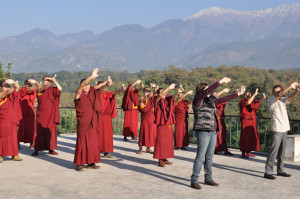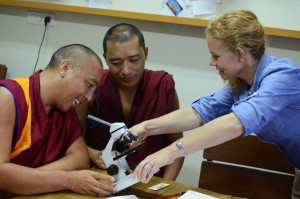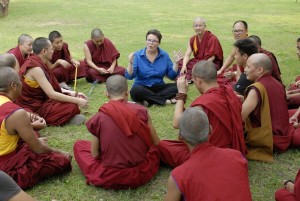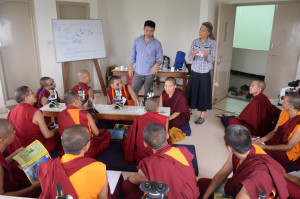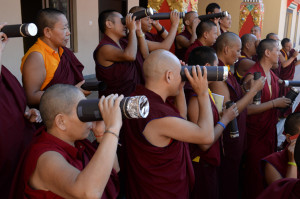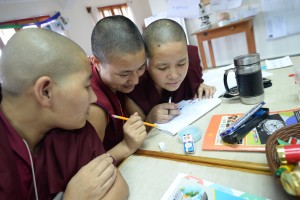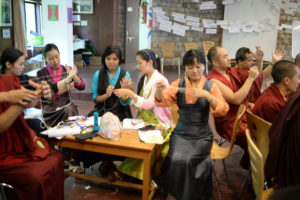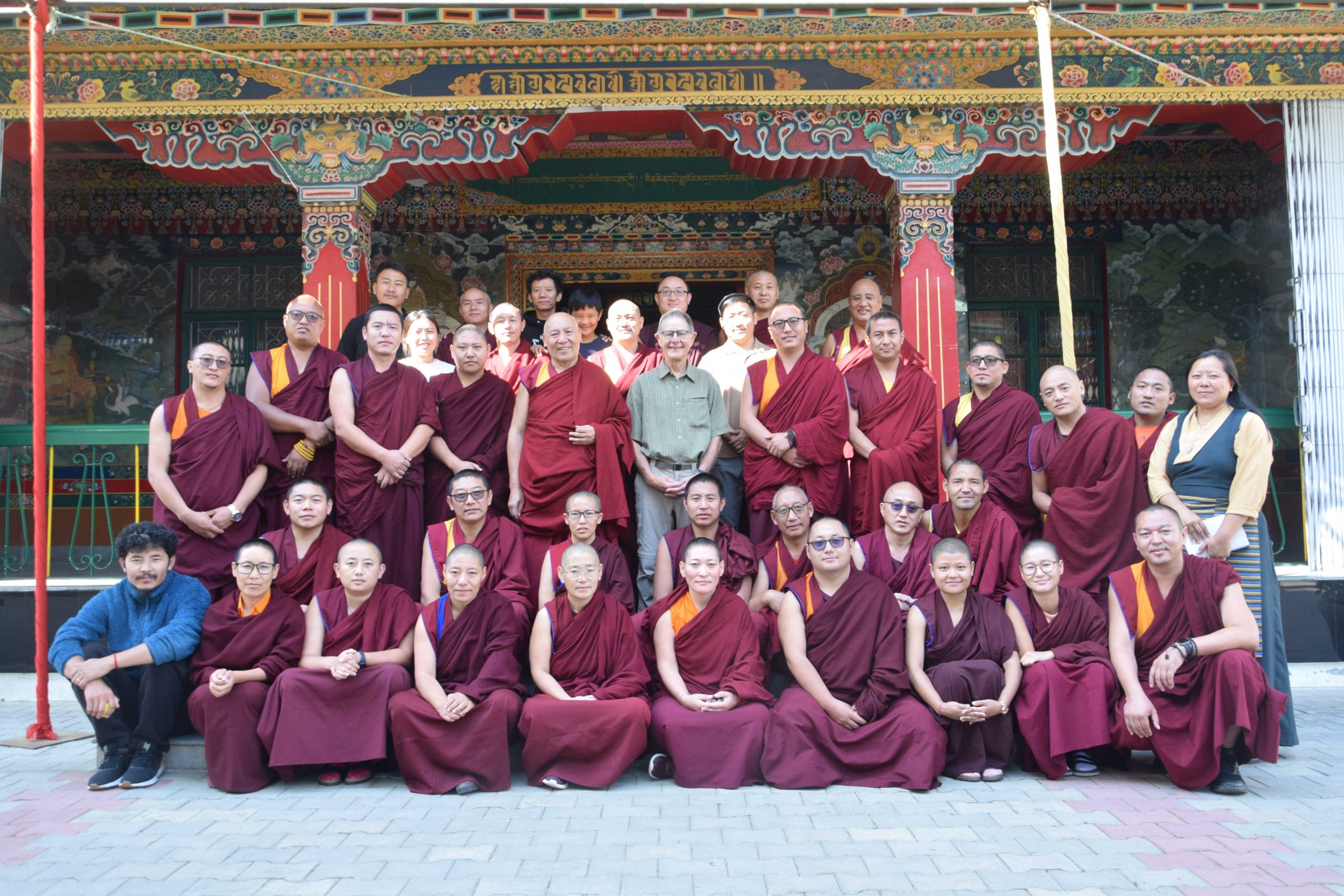Introductory Science Course for Monastic Graduates
From 2011 , a 4-week intensive introductory science course was offered to senior monastics that had finished their formal monastic training, were positioned to be educational leaders in the monastic community, and had never had any exposure to science. Two hundred monastics from fifty different institutions participated in one of the 7 courses offered. During the 4-week intensive training, different strands of hands-on investigations provided a real experience in conducting scientific research and direct insights into how modern science establishes knowledge. Journaling and multiple writing exercises integrated into the course provided opportunities for reflection, solidified content learned, and supported the formulation of new questions.
2011 Introductory Science Course
November 20th to December 14th, 2011
College for Higher Tibetan Studies, Sarah
Western Faculty
David Presti, University of California, Berkeley
Emiliana Simon-Thomas, Greater Good Science Center
David Barker, Exploratorium
Linda Shore, Exploratorium
Paul Doherty, Exploratorium
Bryce Johnson, Exploratorium
2013 Introductory Science Course
October 23rd to November 20th, 2013
Songtsen Library, Dehradun
Western Faculty
Chris Impey, University of Arizona, Tucson
Eric Chudler, University of Washington, Seattle
Gaëlle Desbordes, Harvard Medical School
Linda Shore, Exploratorium
Tammy Cook-Endres, Exploratorium
Tory Brady, Exploratorium
Julie Yu, Exploratorium
Bryce Johnson, Exploratorium
Modesto Tamez, Exploratorium
“In the workshop, you can ask whatever you want to the teachers. You don’t have to be afraid of people looking at you. Also you don’t have to worry that they may get annoyed by simple question or something like that. It’s open… Learning science really helps to understand Buddhism. I never see it as something disturbing Buddhist understanding.”
— Geshe Sonam Gonpo, Sera Jey Monastery, Monastic Graduate (2011) (from 2014 interview)
2014 Introductory Science Course
October 1st to October 30th, 2014
College for Higher Tibetan Studies, Sarah
Western Faculty
Eric Chudler, University of Washington, Seattle
Vivian White, Astronomy Society of the Pacific
Barry Bruce, University of Tennessee
Emiliana Simon-Thomas, Greater Good Science Center
David Fresco, Kent State University
Kathrine Shephard, Kent State University
Marieke Van Vugt, University of Groningen
Marcel Bonn-Miller, Center for PTSD, Veterans Hospital
Lori Lambertson, Exploratorium
Paul Doherty, Exploratorium
Eric Muller, Exploratorium
Bryce Johnson, Exploratorium
“Learning science by the Geshes is very important. The Geshes take care of the monastery, they take part in the administration of the monastery. On top of that, if they learn about science, when they give public talks, they can incorporate some ideas from science, it becomes more holistic. Science and Buddhism are like two wings of the bird. If you’re only good at Buddhism then you are having just one wing. Buddhism mostly focuses on consciousness and compassion and it has its own ways of learning. Science is something that’s really helpful for the human being in terms of practicality. If somebody is good at science, but their way of thinking is not so oriented in a positive way: it might not be very helpful. So having a good knowledge of both of these fields will be very helpful to humanity. Now, often when I meet with friends, we talk about science and Buddhism topics.”
— Geshe Tsundup Gyatso, Drepung Gomang Monastery, Monastic Graduate (2014)
2015 Introductory Science Course
September 7th to October 3rd, 2015
Namdroling Monastery, Bylakuppe
Western Faculty
Chris Impey, University of Arizona, Tucson
Tim Maudlin, New York University
Eric Chudler, University of Washington, Seattle
Lori Lambertson, Exploratorium
Julie Yu, Exploratorium
Bryce Johnson, Exploratorium
2016 Introductory Science Course
October 10th to November 5th, 2016
Sherabling Monastery, Bir
Western Faculty
Modesto Tamez, Exploratorium
Paul Doherty, Exploratorium
Eric Chudler, University of Washington, Seattle
Laura Specker Sullivan, University of Washington, Seattle
Jim Lane, Knowles Science Teaching Foundation
Rachel Sanders, Knowles Science Teaching Foundation
Linda Shore, Astronomy Society of the Pacific
2017 Introductory Science Course
August 28th to September 23rd, 2017
Dolmaling Nunnery
Western Faculty
Julie Yu, Exploratorium
Tory Brady, Exploratorium
Karen Kalumuck, Feral Science
Rachel Sanders, Knowles Science Teaching Foundation
Shannon Marago, Humboldt State University
Vishnya Maudlin, New York University
Vicki Zakrzewski, Greater Good Science Center
Tenzin Paldon, Library of Tibetan Works & Archives
2018 Introductory Science Course
September 3rd to September 28th, 2018
Namgyal Institute of Tibetology, Sikkim
Western Faculty
Curt Gabrielson, SESIM, Timore Leste
Gustavo Hernandez, Community Science Workshop, Watsonville
Christopher Impey, Arizona State University, Tucson
Richard Maclehose, University of Minnesota
Dedra Buchwald, Washington State University
Linda Shore, Astronomy Society of the Pacific
Eric Chudler, University of Washington
2023 Introductory Science Course
October 8th to October 28th, 2023
Library of Tibetan Works and Archives
Western Faculty
David E. Presti, University of California, Berkely
Sonal Thorve, Pimpri Chinchwad Science Park
Tenzin Rabga, Seoul National University
Core Topics:
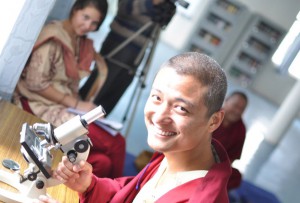
Biology of Life
Using microscopes, the monastics explore the biological world around them, discover cells of different organisms, and identify characteristics of life. Microscope sessions are complemented by interactive lectures and hands-on activities that further explore the structure and function of cells. The question of consciousness and sentience is central to Buddhist philosophy. These sessions support a science-based dialogue on Buddhist and Western perspectives of life. Experiences also support the monastic graduates’ capacity to engage other biological sciences, including neuroscience.
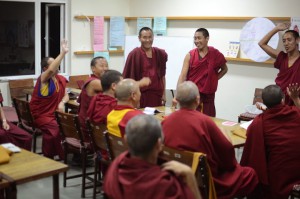
Inquiry into Physical Phenomena
Observation is an important part of science yet it is seldom taught in science courses. These hands-on sessions explore the nature of science and human perception, particles and forces that make up the universe, and the boundaries of scientific knowledge. Investigations into light, color, states of matter, atoms, electricity, and magnetism will be introduced through investigations conducted by the monastics. Monastics have deep questions about both perception and the atomic world, and activities and discussions will explore connections between the two traditions.
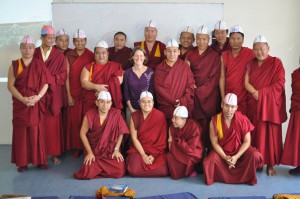
Brain, Mind, and Neuroscience
Interactive lectures and several activities delve into the history of neuroscience, neuroanatomy, states of consciousness, sensory perception (vision, hearing, touch, taste, and smell), memory and learning, the autonomic nervous system, and neuroethics. Neuroscience overlaps with Buddhism in important ways, and these sessions help monastics gain a rich understanding of how to discuss the brain and consciousness with scientists, as well as the limitations of scientific methods at probing deep questions of consciousness and human potential.
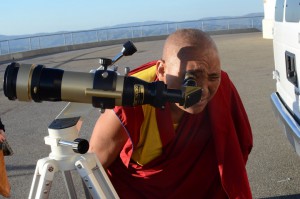
Astronomy to Cosmology
Observations of the day and night sky deepen understanding of the solar system, and interactive lectures and hands-on activities immerse monastics in dialogues about the history and evolution of our universe. Investigations into the formation of the planets, the evolution of life, and limits of life, within our solar system and beyond, provide a rich context for discussion.
“They were willing to do anything activity-wise, anything, and they love just getting into it. They ask a lot of questions and some of the questions were great questions that took the science even deeper and beyond where I could answer them. They’d do that all day given the opportunity because they are so curious, but then some of the questions really revealed such unevenness in their own science knowledge like, they’d be really interested in quantum physics, but then they didn’t really know what an atom was yet.”
— Lori Lamberston
Teacher Institute, Exploratorium
Alternating topics:
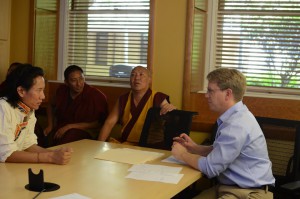
Collaborations with Neuroscience
These sessions focus on pioneering research that has been conducted in collaboration with Buddhist scholars and contemplative practitioners. These works investigate how various forms of meditation (attention focus, loving-kindness, compassion) relate to Western psychological constructs like cognition, emotion, health and well-being.
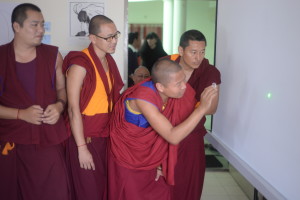
Quantum Mechanics
His Holiness the 14th Dalai Lama emphasizes his long-term interest in quantum mechanics and his deep belief in its strong connection to Buddhist epistemology. The monastics conduct classical interference experiments, first using sound, then water, and then investigating the quantum nature of light through the classic two-slit experiment. Explorations into quantum mechanics provide descriptions of particle and wave-like behavior of matter and energy and how these observations sparked a revolution from “classical” to “new.”
This course was developed by the Teacher Institute at the Exploratorium in partnership with the Science for Monks program and the Library of Tibetan Works & Archives. Each year that we have implemented this course, we have made modifications and adjustments in response to interviews and evaluations conducted. Content posted reflects the most recent version.

